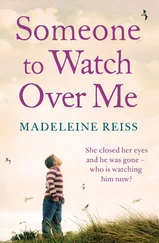I was grateful for a moment to be compelled to say, “Excuse me.” I met the three women at the door and in the vestibule helped Mrs. Corrigan into her coat. Mr. Fagin had arranged for one of the assistants to take all them back to Greenpoint (Greenpernt, as he said it) every evening since the Corrigan apartment had been damaged slightly by the fire and more thoroughly by the fire hoses. Mr. Fagin and I both escorted her to the car waiting in the street, and when he went ahead to open the car door, I felt the full weight of her as she leaned on my arm. I recalled how she had walked her son, her boy, down the steps every morning on the way to his kitchen chair, his hand tucked in the crook of her arm the way a bride holds the arm of a groom. I thought again of the effort it must have taken her to deliver him there every morning in his pressed shirt and his brushed suit.
When the car pulled away from the curb, I turned back. Walter Harnett was at the foot of the stoop now, his hat in his hand. Mr. Fagin bid him good night, glanced over his shoulder at me, and then went inside. I said, when Walter approached, “I’m sorry, Walter,” in my professional way. He looked down at me. He seemed to have gathered himself together, there was something of the old swagger and charm, despite the red-rimmed eyes. He had taken a remembrance card. I could see the edge of it in his breast pocket. “They oughta bury him with that chair,” he said, smiling again. “Remember that chair he sat in every day?”
I nodded. “I was just thinking about it.” It might have been the first time in my life I understood what an easy bond it was, to share a neighborhood as we had done, to share a time past. “It’s still there,” I added, as if this should amaze him. “At least it was there this morning. No one’s had the heart to take it in.”
He swayed a little. “No fooling?” he said, and then “Jeez.” He surveyed the street scene above my head, but without interest. “I never come here anymore,” he said. “I moved my mother up to the Bronx, closer to us.”
And I was surprised to discover there was a knife edge to it, the “us.”
“I think I heard that,” I said, and moved closer to Fagin’s door. “I think my mother mentioned it.”
“Bronx’s much nicer.” He was slurring his words. He touched the remembrance card, or perhaps it was the flask underneath. “I wouldn’t wish this neighborhood on a dog.”
I put out my hand. I had learned something about moving people around from Mr. Fagin. “Good night, Walter,” I said. He looked at my outstretched hand, but didn’t take it. “I was 4F, you know,” he said. “The gimp.”
“Sure,” I said.
“I wanted to join up,” he said. “More than anything.”
“Sure,” I said again, and lowered my hand.
“Marines.”
I nodded. I imagined him as some kind of aide de camp, conferring with Patton or MacArthur, his hands held behind his back. “My brother’s army air force,” I told him. “Over in England.”
Walter shifted unsteadily. The odor of cigarettes and alcohol seemed to be woven into the fabric of his suit. It was a charm to me still, alcohol on a man’s breath. “Army air force is pansies,” Walter said. “Give me the marines.”
I shrugged. I was aware of the difference between what Walter Hartnett had become in my recollection and how he seemed to me now, in the flesh, heavier than he had been, with all his sharp sophistication worn down to a sad childishness. It was a kind of madness, to be charmed by him still. “Long as he’s safe,” I said. “That’s all I care about.”
Walter peered down at me, maybe a little distrustful now. “Do you want to get a drink?” he asked. “Are you through working?” It occurred to me then that he had not been surprised to find me in Fagin’s parlor, that he had known, somehow, before he came, that I worked here. Perhaps his mother, too, had kept him informed.
I shook my head. “I’ve got to meet someone,” I told him. I saw him glance again at my chest, squinting a bit now, as if to decipher the names of the boys who had been inside my bra since his last visit. “A boyfriend?” he asked, and when I only shrugged, he swayed a bit and said, “I get it.”
Standing with him between the streetlight and the light cast by Fagin’s door, I recognized that there was an opportunity here—opportunity for recompense—pain for pain. Opportunity to say, “A midshipmen, in fact, an able-bodied seaman,” and wouldn’t that have given Walter Hartnett what for?
But Walter Hartnett had loved blind Bill Corrigan since he was a lonely little boy, conferring with him on the sidewalk beside his kitchen chair. Walter and Bill: blind you, gimpy me. It was Walter who said, “Naa, Bill, not her,” when even Gabe had failed to be kind. Walter who had come here tonight—perhaps the only one of his contemporaries left behind—come down from the Bronx to weep like a child before the world closed up over Bill Corrigan’s passing.
I held out my hand again—“It was nice seeing you, Walter”—and this time he took it. I said, “Let’s both keep poor Bill in our prayers,” because if Walter Hartnett hadn’t loved me, he had surely loved Bill Corrigan, and loving Bill Corrigan had now broken his heart.
He shook his head. “More like him praying for us,” he said. “Bill’s retired from the game.”
I saw him grope for his breast pocket again as he walked away under the streetlights, weaving a bit. But it wasn’t the flask, it was the remembrance card he was after. Just before he rounded the corner, I saw how the light caught it, cupped in the palm of his hand.
Of the fifteen or so patients in the waiting room, not one of them sat alone. I mentioned this to my daughter, who looked up from her magazine, looked around, and said, “That’s true.”
“That’s nice,” I said. It was the eye surgeon’s office. It was the morning he “did cataracts.”
“They require that you bring someone to help you home,” Susan said. “It was in the instructions he gave you.”
“I suppose you could always take a cab if you were on your own,” I whispered. Five years widowed, eight without Gabe, thirty without my mother in the world, and sixty-some-odd (sixty-six, could it be?) since my father was gone, and although I had four good grown children to depend on, I sometimes felt I negotiated this time of my life as if from a high, precarious place. For every kindness my children bestowed, every lift to the doctor’s, every errand run or holiday dinner shared, I found myself imagining how I might manage if they weren’t there, couldn’t come, were otherwise engaged.
“No,” Susan said softly. “The paper said you had to bring someone to escort you home. Another person,” she added.
I paused. “I guess you could call an escort service, if you didn’t have someone,” I said, and when my daughter impatiently dropped the magazine to her lap, I quickly added, “I’m kidding.”
Susan raised the magazine again. “Relax,” she said, kindly enough, but meaning, I knew, stop talking. Susan had had a rough morning with her children, or so she’d told me when she came to the house, and was not looking forward to going into work when my surgery was over. The whole firm was on edge, a huge case, a court date approaching. And now the doctor was running behind.
The patients around us were middle-aged and older, the middle-aged ones sitting mostly side by side with their peers—spouses or friends—the older ones, every one of them, with younger escorts. Children, no doubt, although the oldest woman in the room was with a black girl, Jamaican from the sound of her voice, a nurse or an aide. Hired. There you go, I thought. An escort. But said nothing.
The doctor came out in his pale-blue scrubs, all the little strings of his outfit, the ones that tied the cap to his head, the ones that held the mask he had dropped around his neck, the ones that swung from his drawstring pants—which I always felt were undignified for a professional man—trailing as if he were caught in a breeze. Or running, perhaps, as no doubt he was, since he was running behind and the office was filled with patient patients and their ready eyes.
Читать дальше












